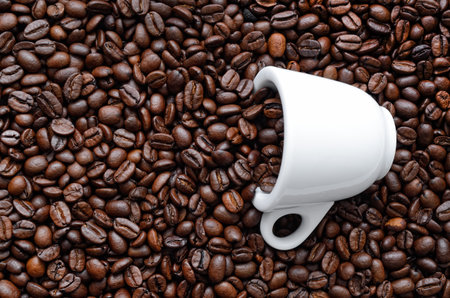A Fresh Brew: Understanding Decaf’s Role in UK Coffee Culture
Over recent years, decaffeinated coffee has quietly brewed its way into the hearts of British coffee lovers, reshaping morning rituals and café menus alike. Traditionally, UK coffee culture was synonymous with a strong cup of builder’s tea or a full-bodied espresso, but today, decaf is finding its own unique niche. Its growing popularity among health-conscious Britons, shift workers, and those simply wishing to savour the taste of coffee without the buzz speaks volumes about changing habits across the nation. From bustling London high streets to quaint Yorkshire cafés, decaf options are no longer an afterthought—they’re an expectation. This shift mirrors broader lifestyle trends towards wellbeing and sustainability, positioning decaf as both a modern alternative and a reflection of evolving tastes. As more UK drinkers reach for their eco-friendly, caffeine-free brew, decaf is firmly establishing itself as a staple of British coffee culture—one cup at a time.
2. From Rainforest to Roast: Sourcing Sustainable Decaf Beans
For UK coffee aficionados who crave a guilt-free decaf, the journey from rainforest to roast is more than just a matter of taste—its a commitment to ethical sourcing and environmental responsibility. In recent years, British consumers have become increasingly discerning, seeking out beans that uphold both flavour and fair practice. The cornerstone of sustainable decaf sourcing lies in reputable certifications such as Fairtrade and the Rainforest Alliance, which assure drinkers that their brew supports both people and planet.
The Importance of Ethical Certifications
Ethical certifications are not mere marketing buzzwords; they offer tangible benefits to growers and ecosystems alike. By opting for certified decaf, UK drinkers can be confident their choices contribute directly to better wages, safer working conditions, and sustainable farming methods. Below is a quick comparison of what each certification stands for:
| Certification | Main Focus | Impact on Growers | Environmental Benefits |
|---|---|---|---|
| Fairtrade | Economic fairness & social justice | Minimum price guarantee, community development funds | Promotes organic practices & reduces chemical use |
| Rainforest Alliance | Biodiversity & ecosystem conservation | Training in sustainable agriculture, improved livelihoods | Protects forests, wildlife, and water resources |
Sustainable Sourcing: Beyond the Badge
While certifications are essential, many UK roasteries go further by developing direct trade relationships with farmers. This allows for greater transparency and often leads to investments in local communities—from funding schools to supporting health clinics. Such partnerships can also help preserve traditional cultivation methods that maintain soil health and biodiversity.
The British Approach: Conscious Choices Matter
In Britain’s vibrant café culture, ordering a cup of decaf isn’t just about what’s in your mug—it’s about making a statement. Whether you’re sipping an afternoon flat white or brewing at home, choosing sustainably sourced decaf ensures you’re supporting ethical practices from bean to cup. By prioritising these options, UK coffee lovers play a crucial role in shaping a more equitable and eco-friendly global coffee industry.
![]()
3. Green Decaffeination Methods: Beyond Chemicals
For the discerning UK coffee drinker, decaf no longer means sacrificing sustainability at the altar of convenience. Traditional chemical-based decaffeination methods, often reliant on solvents like methylene chloride or ethyl acetate, are increasingly being set aside in favour of greener approaches. Among these, water-process and CO2 decaffeination stand out as natural techniques embraced by eco-conscious UK brands eager to tread lightly on the planet.
The Swiss Water Process is a shining example of environmental innovation. Using only pure water and activated charcoal filters, this method gently removes caffeine from beans without the need for harsh chemicals. The result? A cup that preserves the integrity and nuanced flavours of the original bean—much to the delight of British palates attuned to quality and provenance. Furthermore, the process produces minimal waste and enables responsible management of water resources, making it a favourite among local roasteries committed to sustainability.
Meanwhile, supercritical CO2 decaffeination has carved its niche among progressive UK roasters. This technique uses naturally occurring carbon dioxide under high pressure to extract caffeine, leaving behind the bean’s essential oils and full-bodied flavour. As CO2 can be recaptured and reused in a closed-loop system, this approach significantly reduces environmental impact compared to conventional methods. Local brands leveraging this technology are proud to offer decaf options that are both clean-tasting and kind to the earth—a testament to Britain’s growing appetite for conscious consumption.
From independent cafes in London’s Shoreditch to artisan roasteries nestled in the Lake District, these green decaffeination methods reflect a broader shift towards mindful sourcing and production across the UK coffee scene. By choosing water-process or CO2 decaf, British consumers signal their support for both taste and sustainability—proof that you truly can have your cuppa and drink it too.
4. Packaging with Purpose: Tackling Waste in British Coffee Shops
The journey towards sustainability in decaf doesn’t end at the roasting stage—it continues into the hands of UK coffee lovers. One of the most visible challenges facing British cafés and roasters is packaging waste, particularly single-use plastics. Across the country, a new wave of independent coffee shops and artisanal roasters are adopting innovative solutions to reduce their environmental footprint while meeting the discerning standards of local drinkers.
Minimising Single-Use Plastics
Many British coffee establishments are actively moving away from plastic packaging. Instead, they’re sourcing biodegradable bags for their beans and compostable stirrers for takeaway drinks. Some have even gone entirely plastic-free behind the counter, using alternatives like paper straws or wooden cutlery. These shifts not only reduce landfill but also resonate with a growing eco-conscious clientele.
Compostable Cups: A Step Forward
Coffee shops across the UK are increasingly championing compostable cups made from plant-based materials such as PLA (polylactic acid). These cups break down much faster than traditional plastics, especially when disposed of correctly through commercial composting schemes available in many urban centres. Here’s a quick comparison:
| Type | Material | Decomposition Time | Environmental Impact |
|---|---|---|---|
| Traditional Plastic Cup | Petroleum-based Plastic | Hundreds of Years | High; persists in landfill and oceans |
| Compostable Cup | Plant-Based PLA | 6-12 Months (with proper facilities) | Low; returns to earth as compost |
| Paper Cup with Plastic Lining | Paper & Polyethylene | Up to 30 Years | Medium; recycling limited by lining |
Encouraging Reusable Habits among Customers
The cultural shift towards reusables has gained real momentum in the UK. Many high street chains and independent cafés now offer discounts for customers who bring their own cups—a small gesture that adds up over millions of cups sold each year. Some local heroes have gone further, launching cup-share schemes where customers borrow and return branded reusable mugs within a network of participating shops.
The Role of Community Initiatives
From Brighton to Edinburgh, community-driven campaigns like “Refill” encourage people to carry their own water bottles and coffee cups, reducing single-use waste on a national scale. These efforts are supported by digital apps mapping out friendly venues—making it easier than ever for Brits to embrace sustainable habits with every caffeine fix.
A Tasteful Way Forward
Sustainability in British decaf culture is about more than just what’s in your cup—it’s about how your coffee arrives there, and what you do with what’s left behind. By choosing businesses that prioritise thoughtful packaging, UK drinkers can enjoy their decaf with peace of mind, knowing they’re part of a wider movement for positive change.
5. Brewing Responsibly: Waste Reduction at Home and Local Cafés
Minimising Your Coffee Footprint
For UK decaf drinkers, brewing responsibly is as much about flavour as it is about reducing your environmental impact. Every step, from grinding beans to pouring the final cup, offers an opportunity to make more sustainable choices—whether you’re at home or enjoying your favourite local café.
Practical Tips for Disposing of Coffee Grounds
Don’t just toss those used coffee grounds in the bin! In Britain, you can pop them into your council food waste caddy or compost heap. Coffee grounds enrich compost with nitrogen and help deter garden pests like slugs. For urban dwellers, many community gardens or allotment schemes will happily accept spent grounds. If you’re a regular at a local café, ask if they offer free grounds for customers to take home—many independent spots do.
Selecting Eco-Friendly Equipment
When it’s time to update your kit, opt for equipment designed with sustainability in mind. Look out for reusable stainless steel filters instead of single-use paper ones, and choose glass or ceramic French presses over plastic models. Consider energy-efficient kettles with variable temperature settings—they save electricity and ensure you never burn your precious decaf beans. For pod machine fans, seek out brands that offer fully recyclable or compostable pods widely accepted by UK recycling schemes.
Mindful Choices from Bean to Cup
Your journey toward sustainability doesn’t end with brewing. Buy only what you’ll use to keep beans fresh and avoid waste. Support UK roasters who champion direct trade and low-impact processing methods—look for certifications like Fairtrade, Rainforest Alliance, or Organic on the bag. When visiting cafés, bring a reusable cup (most chains offer a small discount), skip the plastic stirrers and lids, and refuse unnecessary napkins. Small changes add up to a big difference when multiplied across millions of cups brewed each day in Britain.
The Sustainable Sip
Embracing eco-friendly brewing rituals not only elevates your daily decaf but also helps preserve the British countryside and global ecosystems alike. With thoughtful disposal of grounds, clever kit choices, and mindful habits, every cup becomes a celebration of sustainability—right down to the last sip.
6. Community and Consciousness: Inspiring Ethical Choices
Across the UK, a groundswell of grassroots action is transforming decaf coffee culture into a force for environmental good. Community-led initiatives, such as local composting schemes in Bristol and London’s zero-waste collectives, are breathing new life into spent coffee grounds—once destined for landfill, now repurposed as rich fertiliser for urban gardens or even as eco-friendly fuel briquettes. These projects not only reduce waste but also foster a spirit of circular living, inviting coffee lovers to become active participants in sustainable cycles.
Education is another powerful driver. Organisations like SustainUK and the Coffee Sustainability Network regularly host workshops in neighbourhood cafés, teaching everything from responsible sourcing to at-home brewing with minimal footprint. These sessions spark conversations among British drinkers about ethical consumption, empowering them to ask questions about their favourite decaf’s origins and production methods.
The influence extends further with national campaigns—such as “Choose Local, Brew Ethical”—which spotlight independent roasters championing transparency and planet-friendly practices. Through social media movements and pop-up tasting events, these campaigns encourage Britons to seek out Rainforest Alliance Certified or Fairtrade decaf options, reinforcing that every cup is an opportunity for positive impact.
Empowering Informed Choices
By shining a light on these homegrown efforts, UK consumers are inspired to scrutinise labels, support businesses with robust green credentials, and adopt simple habits like reusing coffee packaging or opting for reusable cups. The collective consciousness around sustainability is growing stronger by the day—proving that mindful choices at the counter can ripple outwards, shaping the wider industry for the better.
Together Towards Greener Cups
This movement isn’t just about ticking boxes; it’s about cultivating a sense of belonging and shared responsibility—from bean to cup. Whether you’re sipping your morning flat white in a bustling Manchester café or brewing decaf at home in Cornwall, every small action counts. By embracing these community-driven changes, British decaf drinkers are ensuring their daily ritual is both delicious and deeply considerate of the world around them.


